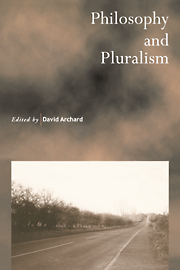Book contents
- Frontmatter
- Contents
- Notes on Contributors
- Introduction
- Philosophy in Different Cultural Contexts
- A Case for Philosophical Pluralism: The Problem of Intentionality
- William James, ‘A Certain Blindness’ and an Uncertain Pluralism
- Cultural Realism: the ancient philosophical background
- Religion and Pluralism
- A Single True Morality? The Challenge of Relativism
- Pluralism, Realism and Truth
- Value-Pluralism
- Moral Philosophy and its Anti-pluralist Bias
- Coping with the Many-Coloured Dome: Pluralism and Practical Reason
- Rawlsians, Pluralists, and Cosmopolitans
- Political Liberalism, Secular Republicanism: two answers to the challenges of pluralism
- ‘Race’ in Britain and the Politics of Difference
- Tragedy, Moral Conflict, and Liberalism
- References
Cultural Realism: the ancient philosophical background
Published online by Cambridge University Press: 30 October 2009
- Frontmatter
- Contents
- Notes on Contributors
- Introduction
- Philosophy in Different Cultural Contexts
- A Case for Philosophical Pluralism: The Problem of Intentionality
- William James, ‘A Certain Blindness’ and an Uncertain Pluralism
- Cultural Realism: the ancient philosophical background
- Religion and Pluralism
- A Single True Morality? The Challenge of Relativism
- Pluralism, Realism and Truth
- Value-Pluralism
- Moral Philosophy and its Anti-pluralist Bias
- Coping with the Many-Coloured Dome: Pluralism and Practical Reason
- Rawlsians, Pluralists, and Cosmopolitans
- Political Liberalism, Secular Republicanism: two answers to the challenges of pluralism
- ‘Race’ in Britain and the Politics of Difference
- Tragedy, Moral Conflict, and Liberalism
- References
Summary
I understand Pluralism to be the doctrine that, either generally or with reference to some particular area of judgement, there is more than one basic principle. It endorses the possibility that some particular case may arise which Will be adjudicated in one way if one principle is applied while another principle points otherwise and to an answer which, at least in practice, is incompatible. Thus in morality, according to pluralism there may be more than one correct answer to the question of which of the decisions available in some particular situation is the best (Kekes, 1993, esp. pp. 9–15; see also the valuable collection of essays Paul, Miller and Paul, 1994).
The fundamental values are incommensurable in their plurality; there is no single scale within which all the competing considerations can be weighed with the result that what is promoted on one side will predominate over what is preferred on the other. The same kind of thing can be said about pluralist conceptions of, for example, logic or indeed of philosophy. Divergent systems of logic will sort arguments into valid and invalid specimens in different ways. Different styles of philosophy will assess the significance of various issues and positions in different measure.
In all such cases someone who adopts a pluralist conception will say that we are not required to operate with a single set of commensurable criteria in order to reach the best conclusion.
- Type
- Chapter
- Information
- Philosophy and Pluralism , pp. 47 - 60Publisher: Cambridge University PressPrint publication year: 1996

